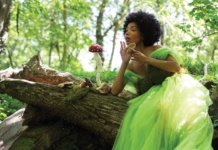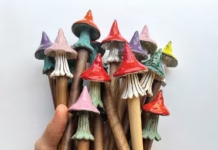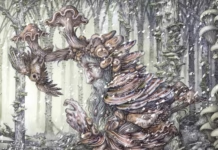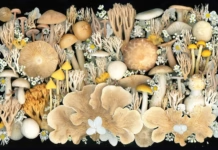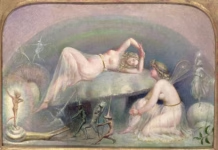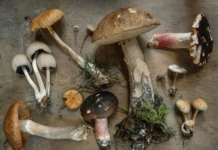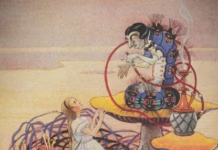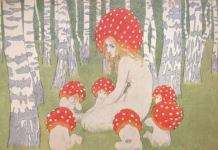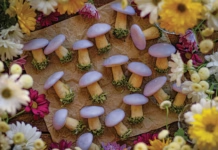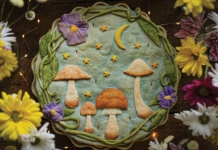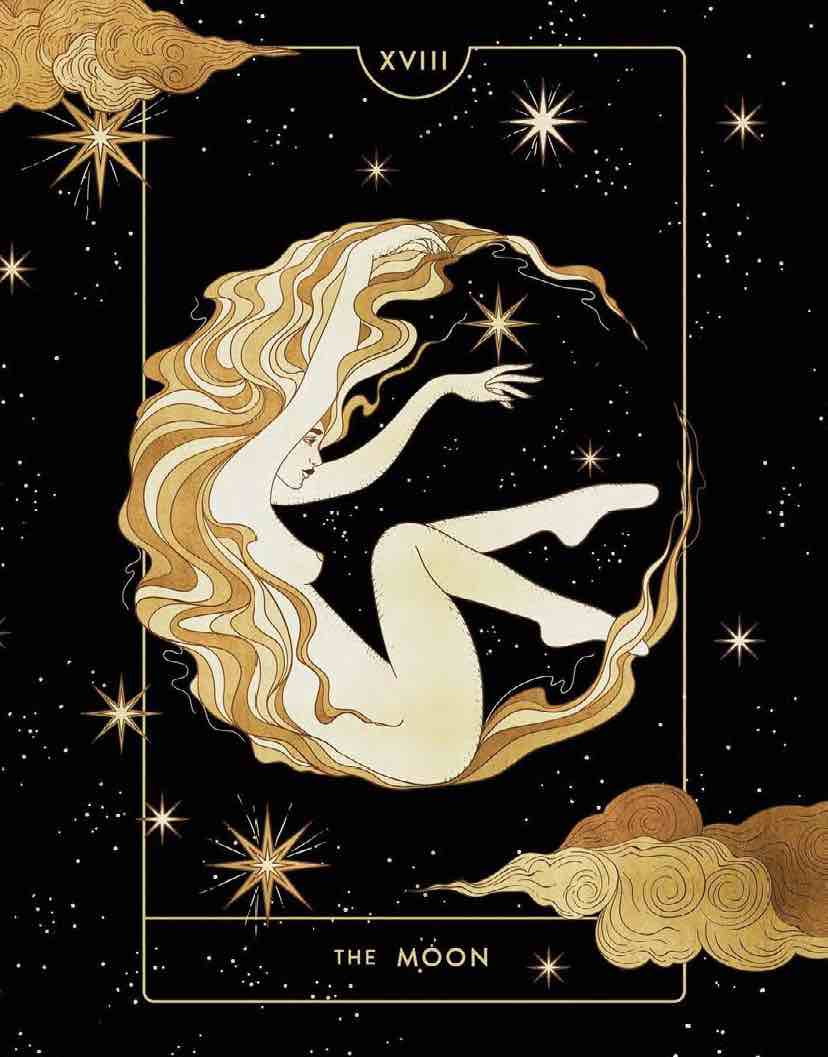Feature Image:
“The Moon” from the Divine Feminine Tarot by Corina Nika.
www.cocorrina.com
You can tell a new tale from an old one by the lack of pause, the lack of a sacred taking in of breath. In the old tales a curse was broken, and then there was a foray into the wild, into the weird, into the uncanny before the journey was resumed. Not today. Too many of our newer stories are patterned on our modern lives—where we experience a momentous idea or heart-busting truth that decisively breaks whatever curse we might be laboring under and then we go right back to doom scrolling or watching cat videos. In these newer tales there is no moment between the breaking of a curse or the liberating of an idea or the catching sight of a pattern that no longer serves and doggedly following it to its root, no moment that allows for time and space and strangeness to settle around like a fine and silky mist. I would say it like this: There are too few dark moon moments—in our stories and in our lives. Getting acquainted with those moments, claiming them for ourselves … now that is the deepest form of decadence I know.
The moon changes its face and in so doing gives us a celestial rhythm to live by. Hunters and fishermen, hares and deer, those of us who bleed and give birth—we all know these rhythms on some level, even if the culture at large has tried to forget about them. The waning moon—that time when in the velvet night sky the moon grows smaller and smaller after triumphing in its fullness—is the traditional time for releasing, banishing, and breaking curses. It is the monthly period when whatever tangles we have gotten ourselves into or whatever snares we have fallen into that others had set for us can be loosened, undone, and taken apart. It is not the worst way to look at modern life, to see it as a story of falling into curses that have various origin points and then learning how to break and undo those curses. So this is the work of the waning moon.
The dark moon is not a phase, not really; it is a single event, a solo line in the lunar choir. The dark moon occurs the night before the new moon—not on the same night and not two nights before. One night before the new moon—precisely. It occurs on a monthly basis for the most part and for the most part only occurs once a month. The dark moon is not the time for breaking curses; that work of unwinding has already been finished. The dark moon is the moment between the rupture of the curse, the release of the burden, the utterance of the sacred no and the beginning of the next part of the journey that is always signified by the presence of the new moon.
This is why the dark moon is the most decadent night of each month. For it makes a demand of us to take time and take space for reflection, for going within, for peering in the smoky glass mirror of our soul soil and taking care. When I think of decadence as we traditionally understand it, I think of Les Fleurs du mal, claret velvet, burgundy wine in a good green bottle, a bleary-eyed morning walking the French Quarter after a night of excess. But these are not the decadence of the dark moon. While each can be alluring in its own way, I’d put down good money that they really only scratch the surface of true indulgence … which is being allowed to go ever deeper.
When we stride across the pitch black plains, arroyos, and mesas of the dark moon, we enter into a realm of the unexpected pleasure of taking care of ourselves and our stories. All too often, rich fabrics, richer foods, and flowers dripping with evil cover up the truth—that there has been a wound or a shock or a hurt that we are just now recognizing, just now recovering from, just now coming to terms with. It refuses to be covered over or hidden away by this or that distraction. Think of it in this way: Our ability to break a curse does not keep us from being marked by the curse. The dark moon gives us the time to grieve that truth as well as the space to apply the needed medicine, which, interestingly enough in our day and age, often feels like an indulgence. To find and apply the needed medicine often feels like something extravagant and deeply decadent as opposed to what it is, which is necessary.
The medicines are different for different people. It might be a bite of sweet chocolate to soothe away the bitter aftertaste of a departed lover. Or a cluster of black grapes alongside a sliver of Point Reyes blue that has a drizzle of local honey snaking over it … because these are the foods that truly leave you feeling nourished. Or the medicines might be more subtle and find you sinking into a natural hot spring under a festival of stars or stepping into the salty waters of your own bathtub as you finally give yourself the gift of a moment away from your schedule. The medicine might be a single blessed night of sleeping in the complete dark without one gadget in the room with you.
The full moon would have us celebrate all we have accomplished and all that we now can see— and so we should. The new moon would have us begin the journey, the next chapter, the story, the initiation. The waxing moon has us busy with building, and the waning moon invites us to dismantle and take apart. But the dark moon asks us to be. That’s all. To practice attending and caring. It is here in this moon-limned pause between all of the ending and beginning that we can experience the deepest decadence, the deepest privilege of all, calling ourselves back to ourselves. Baudelaire’s insight into decadence, which is echoed by many of the Romantics, is that it is paradoxical. It seems that decadence is all about feeling good, feeling pleasure, having our senses intoxicated and delighted. And that is a part of it. But underneath those tableaus is a truth as gritty as the sleep in your eye when you first wake, which is that true pleasure does not come easily or cheaply. It is a gift of the gods, just like wisdom, just like strength, and so you better be prepared to make an offering of something in order to gain it. The dark moon tells us what that might be: your time, your attention, your willingness to show up for yourself, to stand in witness of all that you have done, to look ahead to all that shall come, and to take in and give out that holy breath. There is no greater indulgence than that.
Make Magic
• Look to the skies or look to your calendar and decipher for yourself when the next dark moon occurs.
• Take time before that day and night to do a little thinking and feeling into what curses you have recently laid to rest, what ventures to come will call upon your attention and energy. Pay some attention to where you have been and where you might go next.
• And then ask yourself this question: What marks have been left upon me and what medicines might speak best to them?
• This is magical, oracular work. It would be unusual for the answers to come to you in logical words and forms right after asking the question.
• Instead, you wait.
• You listen. You watch.
• You notice what patterns emerge, what words or sounds or colors or tones call at you again and again. There’s your medicine. You notice what gifts you receive over this period of time, what is given in object, word, effort, or affection.
• And you notice too what might be withheld.
• This all has information for you.
• (This is why, by the way, it is wise to give yourself time before the dark moon for this ceremony.)
On the day of the dark moon, you begin your ceremony by taking a salt bath—any kind of salt in your bath or added to your shower. When you step out, put on clean clothes and cense yourself in a sacred and aromatic smoke: frankincense, copal, myrrh, cedar, juniper, bay leaf, or pine. Then you call in your medicines. If it is going for a walk in the woods, you go for a walk in the woods. If it is prayer, then you pray. If it is feasting, then feast. Take the time you can: an hour, three hours, ten minutes … but for however long you are able to take, be fully present. No excuses and no distractions. End your ceremony by drinking a full glass of sweet water and make time to go out under the night sky and say thank you in whatever words wing straight from your heart.
And then … do it again in a month.




